CORONAVIRUS: DAILY DIGEST #7
Lockdown makes waves even before it starts
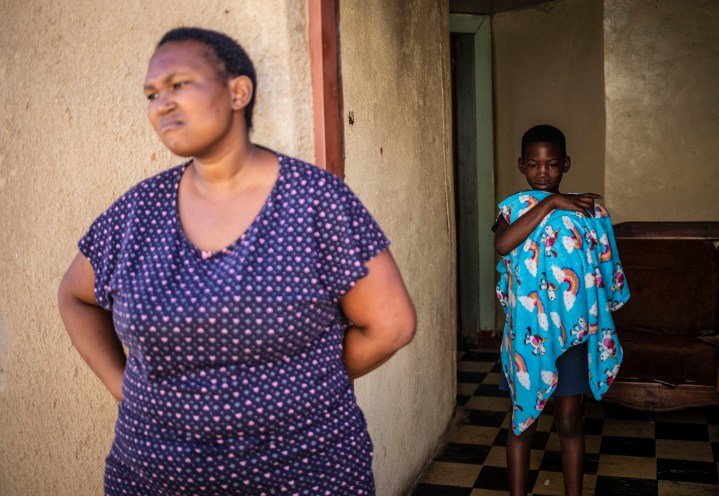
Things changed overnight in South Africa on 15 March, and it won’t be the last time it does. Daily Maverick’s Daily Digest will provide the essential bits of information about Covid-19 in South Africa and the world each day. Please do read on to understand these issues more deeply.
Only two people out of 709 who are confirmed to have Covid-19 in South Africa have been admitted to intensive care units at hospitals. Five people who had the virus have now tested negative for it. Most patients have mild symptoms.
Three medical professionals have been infected – two had recently travelled and another had been in contact with someone who had Covid-19 – according to Health Minister Zweli Mkhize on Wednesday 25 March.
He reiterated that people can be tested only if they show symptoms and if they have been in contact with someone who has tested positive. They can get free tests via a doctor, clinic or hospital in the public system.
He said on Wednesday 25 March that he had met with private healthcare providers to request that they bring down the cost of testing from around R1,400.
South Africa’s first fatality in this pandemic might be a man who was denied healthcare because he did not have Covid-19. On the same day that President Cyril Ramaphosa announced the national lockdown, it was announced to a patient named Mpilo that he would be discharged from hospital to make way for Covid-19 emergencies. He had been there for a week with no explanation of why he was suddenly paralysed from the waist down. He left in a wheelchair with doctors suggesting that he might have spinal TB. He says he is going home to die with his family. It was Tuesday, World Tuberculosis Day.
In South Africa, more than three million people get sick with TB each year. This year, many might get TB and Covid-19 at the same time. Amy Green unpacks what makes those with TB especially vulnerable to the new coronavirus.
In order for those with TB and HIV to take their medication, they need to eat. This is why Linda van Oudheusden from the Missionvale Care Centre in Port Elizabeth says they cannot stop providing meals for 1,000 elderly people each day during the lockdown.
“Hunger is a force greater than fear,” she said. Estelle Ellis checked in with them and other feeding schemes that are determined to keep going.
There will be 235 food banks in operation around the country to deliver food to those who need it, according to Social Development Minister Lindiwe Zulu.
As has been announced, food supply chains will not be broken by the lockdown. However, all restaurants, cafes, bars and coffee shops will be closed during the lockdown – this means food delivery will be suspended for the 21 days. Bianca Coleman spoke to restaurateurs about how they plan to cope.
Ports are a crucial cog of many supply chains that provide us with essential goods. South Africa’s main ports will remain open but will be operating at reduced levels. Medical and food supplies will be given priority. Jessica Bezuidenhout investigated what the repercussions are of this.

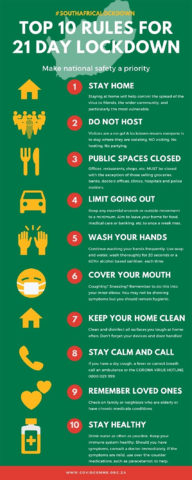
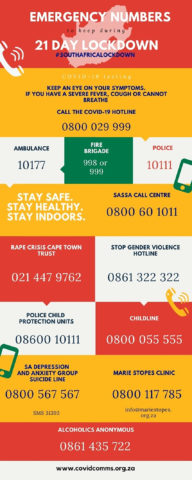
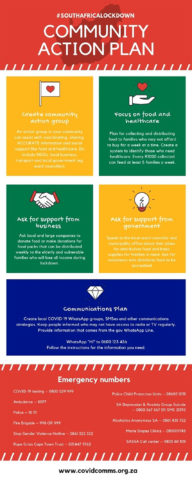
Although tertiary institution students are currently technically on holiday, most will go back to class before the end of the lockdown. The Department of Higher Education, Science and Technology has offered to help tertiary institutions change over to remote teaching if need be. As Sandisiwe Shoba points out, this is unfamiliar territory for many.
The South African Reserve Bank is also sailing off into unchartered waters. It announced yesterday that it would be buying government bonds in order to put more money in the economy as it battens down the hatches for the lockdown. It’s effectively quantitative easing, as Ed Stoddard explains.
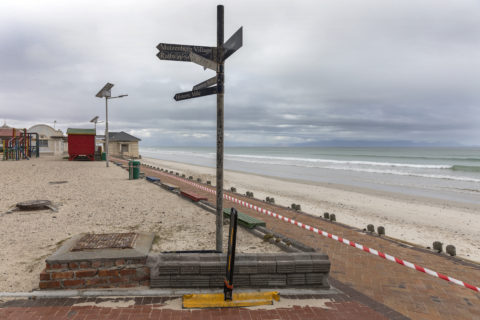
A general view of the empty Muizenberg Beach in Cape Town, South Africa, 25 March 2020. After mandating the closure of all beaches throughout the country, the South African government has now announced a nationwide 21-day total lockdown, starting at midnight on 26 March, in a bid to slow down the spread of the ongoing pandemic of the COVID-19 disease caused by the SARS-CoV-2 coronavirus. (Photo: EPA-EFE/NIC BOTHMA)

Surfers switch over to skateboarding next to the closed Muizenberg Beach in Cape Town, South Africa, 25 March 2020. After mandating the closure of all beaches throughout the country, the South African government has now announced a nationwide 21-day total lockdown, starting at midnight on 26 March, in a bid to slow down the spread of the ongoing pandemic of the COVID-19 disease caused by the SARS-CoV-2 coronavirus. (Photo: EPA-EFE/NIC BOTHMA)
As all of this change swirls around us, some are trying to take stock of it. Athletes, such as South African Olympians Akani Simbine and Wayde van Niekerk, are coming to terms with the postponement of the 2020 Olympics. Others grapple with the pause in their international sporting careers, such as legendary Springbok rugby players Babalwa Latsha and Kimico Manuel.
Scientists in China and the US are working round the clock to pinpoint the biological origins of Covid-19. The most recent research suggests that bat and pangolin viruses recombined to form Covid-19, but they’re not absolutely sure in which animal yet. Don Pinnock and Tiara Walters explain with clarity the science behind this latest find.
Why does this matter right now?
Because it could prevent a pandemic of this scale happening again, that’s why. DM
"Information pertaining to Covid-19, vaccines, how to control the spread of the virus and potential treatments is ever-changing. Under the South African Disaster Management Act Regulation 11(5)(c) it is prohibited to publish information through any medium with the intention to deceive people on government measures to address COVID-19. We are therefore disabling the comment section on this article in order to protect both the commenting member and ourselves from potential liability. Should you have additional information that you think we should know, please email [email protected]"



 Become an Insider
Become an Insider